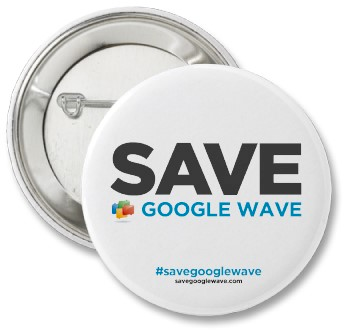Google Wave Waves Goodbye
by Paul Arnote (parnote)
Almost as quickly as it waved hello, it appears that Google Wave will soon be waving goodbye.

Rolled out at last year's Google I/O in May, developers cheered and applauded the advancements and "different thinking" of Google Wave. It promised to revolutionize web-based communication, asking the question "what would email be like if it were invented today?" Google Wave envisioned an interweaving of email, photo sharing, instant messaging, chat, and drag-and-drop file sharing between users.
From the Official Google Blog on August 4, 2010:
But despite these wins, and numerous loyal fans, Wave has not seen the user adoption we would have liked. We don’t plan to continue developing Wave as a standalone product, but we will maintain the site at least through the end of the year and extend the technology for use in other Google projects. The central parts of the code, as well as the protocols that have driven many of Wave’s innovations, like drag-and-drop and character-by-character live typing, are already available as open source, so customers and partners can continue the innovation we began. In addition, we will work on tools so that users can easily “liberate” their content from Wave.
The NEW PCLinuxOS Magazine covered the rollout of Google Wave in the November, 2009 issue, back when Google Wave was only available via invitation from other Google Wave users. While the concept was innovative and fresh, Google Wave may have bitten off more than it could chew. Individual internet applications – email, instant messaging, photo/file sharing, chat, etc. – are so deeply entrenched in the lives of computer users, it would be an exceptionally difficult task to supplant them. Also, many users don't use all of those applications on a regular basis, so for them, Google Wave may have been overkill.
Once users develop certain patterns of usage and habits, it becomes increasingly more difficult to get users to shed or change those habits, the more entrenched those habits become.
Had Google Wave made its debut 10 years ago, or even five years ago, it may well have had a chance to garner the number of users that Google envisioned using Wave. But coming along so late in the "game," when such a large number of users had already developed a pattern of behavior with all the functions and applications that Google Wave sought to replace, the cards were definitely stacked against widespread adoption of a new communication medium.

Despite this, there is a movement under way to Save Google Wave. They even have their own Twitter page. Even though Google Wave hasn't reached the level of usage that Google had envision, it has garnered a very loyal group of niche users. And these users come from all walks of society. Judging from the comments on the web site, those folks range from a theoretical physicist, to novelists, to students and teachers, and everyone in between.
On Twitter, one user makes a very valid point: "I don't understand do we need 5 billion users to keep a product? Why can't it be the perfect tool for a small niche?"
On the web site, comments included this one from a theoretical physicist, who makes a very valid point:
"I am a Theoretical Physicist and I use google wave for collaborating with my colleagues who are in different places around the world. Google wave has to be saved … it is such a brilliant tool … unfortunately, badly advertised (not at all … ). A lot of people would quickly realize its potential and the way it can really change collaborative working in a positive way."
Did Google give Google Wave a fair chance? Given the virtually insurmountable task of changing user habits, a little more than a year is hardly what anyone would declare a fair chance. Throw in a quite limited start, where users were only allowed into the Google Wave arena via invitation. Join this with a lack of publicity (other than the hula-balloo when it was launched), and you cut whatever chances it had for succeeding by at least 90%. Folks can't use what they don't know is available. Thus, users had no chance to change their habits.
I know there are many out there who may be quite happy to see any endeavor by Google fail. They argue that Google is too large as it is, and they despair about Google's questionable data collection practices. In fact, some users are so concerned over these issues, that they avoid using any Google service at all. Honestly, their concerns are not without validity and cause for concern, in a time when personal privacy has diminished enormously and is attacked at every turn. However, Google Wave represented, in many ways, a cutting edge implementation and integration of many services that web users routinely use. It simply didn't have the chance to gain the steam to become as large as was envisioned by Google, in the short time that was allowed.
So Google Wave may have rolled upon our shores, but it leaves us gently, like a slow, low tide. We applaud the innovation, relish in the advances that it showed us was possible with web-based applications, and are sad to see it close shop (providing that the efforts to save it fail, as so many other such efforts tend to do), leaving behind so many unfulfilled promises.